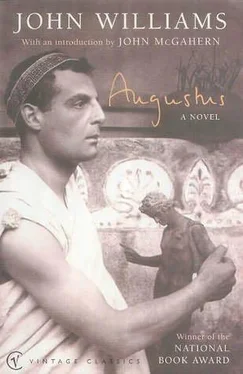John Williams - Augustus
Здесь есть возможность читать онлайн «John Williams - Augustus» весь текст электронной книги совершенно бесплатно (целиком полную версию без сокращений). В некоторых случаях можно слушать аудио, скачать через торрент в формате fb2 и присутствует краткое содержание. Жанр: Историческая проза, на английском языке. Описание произведения, (предисловие) а так же отзывы посетителей доступны на портале библиотеки ЛибКат.
- Название:Augustus
- Автор:
- Жанр:
- Год:неизвестен
- ISBN:нет данных
- Рейтинг книги:3 / 5. Голосов: 1
-
Избранное:Добавить в избранное
- Отзывы:
-
Ваша оценка:
- 60
- 1
- 2
- 3
- 4
- 5
Augustus: краткое содержание, описание и аннотация
Предлагаем к чтению аннотацию, описание, краткое содержание или предисловие (зависит от того, что написал сам автор книги «Augustus»). Если вы не нашли необходимую информацию о книге — напишите в комментариях, мы постараемся отыскать её.
Augustus — читать онлайн бесплатно полную книгу (весь текст) целиком
Ниже представлен текст книги, разбитый по страницам. Система сохранения места последней прочитанной страницы, позволяет с удобством читать онлайн бесплатно книгу «Augustus», без необходимости каждый раз заново искать на чём Вы остановились. Поставьте закладку, и сможете в любой момент перейти на страницу, на которой закончили чтение.
Интервал:
Закладка:
Both of your wives I have treated as my sisters, though the first was too ill-tempered to receive my kindness and the second too ambitious for herself to trust my duty to our common cause. And from my own body I have given five children to our family and to the future of Rome.
Now my first-born and only son, my Marcellus, is dead in your service; and the happiness of his sister, Marcella, my beloved second-born, is threatened by the necessity of your policy. Fifteen years ago-perhaps even ten years ago-I should have been proud that you had chosen one of my children to shape in the succession of your destiny. But now I believe that my pride is vain, and I do not persuade myself that the possession of fame and power is worth the price of it. My daughter is happy in her marriage to Marcus Agrippa; I believe she loves him; I trust that he is fond of her. The divorce that you propose between them will not make her unhappy because she shall have lost the power and prestige that have accreted to her by the marriage; she shall be unhappy because she shall have lost a man for whom she feels respect and affection.
You must understand me, my dear brother; I do not quarrel with your decision; you are right. It is both fitting and necessary that your successor be one with your daughter, either through marriage or parentage. And Marcus Agrippa is the most able man of all your friends and associates. He is my friend, as well as my son-in-law; despite whatever may happen I trust that he shall remain the former.
And thus without resentment let me ask that the permission that I must give for this divorce be the last public act that I shall have to commit. I grant the permission. Now I wish to remove myself from the household in Rome, and remain with my books here in Velletri for as long as I may. I do not renounce your love; I do not renounce my children; I do not renounce my friends.
But the feeling that I had that awful evening, when Vergil read to us of Marcellus, remains with me, and shall remain for as long as I live; it was as if suddenly, and for the first time, I truly saw that world in which you must live, and saw the world in which I had lived without seeing for so long. There are other ways and other worlds in which one might live, humbler and more obscure, perhaps-though what is that in the eyes of the indifferent gods?
I have not done so yet, but within a few years I shall have reached the age when it will no longer be seemly for me to marry again. Give me these few years; for I do not wish to marry, and I shall not regret not having done so, even when I am old. That which we call our world of marriage is, as you know, a world of necessary bondage; and I sometimes think that the meanest slave has had more freedom than we women have known. I wish to spend the remainder of my life here; I shall welcome my children and grandchildren to visit me. There may be a kind of wisdom somewhere in myself, or in my books, that I shall find in the quiet years that lie ahead.
CHAPTER THREE
I. The Journal of Julia, Pandateria (A.D. 4)
Of all the women I have known, I have admired Livia the most. I was never fond of her, nor she of me; yet she behaved toward me always with honesty and civility; we got along well, despite the fact that my mere existence thwarted her ambitions, and despite the fact that she made no secret of her impersonal animosity toward me. Livia knew herself thoroughly, and had no illusions about her own nature; she was beautiful, and used her beauty without vanity; she was cold, and thus could feign warmth with utter success; she was ambitious, and employed her considerable intelligence exclusively to further her ambition's end. Had she been a man, I do not doubt that she would have been more ruthless than my father, and would have been troubled by fewer compunctions. Within her nature she was an altogether admirable woman.
Though I was only fourteen years of age at the time and could not understand the reason for it, I knew that Livia opposed my marriage to Marcellus, seeing it as a nearly absolute impediment to her son Tiberius's succession to power. And when Marcellus died so quickly after our marriage, she must have felt the possibility of her ambition urgently renewed. For even before the obligatory months of mourning had elapsed, Livia approached me. My father, having been offered the dictatorship of Italy in the wake of a famine, and having refused, had some weeks before prudently removed himself from Rome upon the pretext of business in Syria, so that he might not have further to exacerbate the frustrations of the Senate and the people by the presence of his refusal. It was a tactic that he employed often in his life.
As was her habit, Livia came at once to the point.
"Your time of mourning will be ended soon," she said.
"Yes," I replied.
"And you will be free to marry again."
"Yes."
"It is not appropriate that a young widow should remain long unmarried," she said. "It is not the custom."
I believe I did not reply. I must have thought even then that my widowhood was as much a matter of form as my marriage had been.
Livia continued. "Is your grief such that the prospect of marriage offends you?"
I remembered that I was my father's daughter. "I shall do my duty," I said.
Livia nodded as if she had expected the answer. "Of course," she said. "It is the way… Did your father speak to you of this matter? Or has he written?"
"No," I said.
"I am sure that he has been considering it." She paused. "You must understand that I speak now for myself, not your father. But were he here, I would have his permission."
"Yes," I said.
"I have behaved toward you as if you were my daughter," Livia said. "Insofar as it has been possible, I have not acted against your interests."
I waited.
She said slowly, "Do you find my son at all to your liking?"
I still did not understand. "Your son?"
She made a little impatient gesture. "Tiberius, of course."
I did not find Tiberius to my liking, and I never had; I did not know why. Later I came to understand that it was because he discovered in all others those vices he would not recognize in himself. I said: "He has never been fond of me. He thinks me flighty and unstable."
"That is no matter, even if it is true," Livia said.
"And he is betrothed to Vipsania," I said. Vipsania was the daughter of Marcus Agrippa; and though younger than I, she was almost my friend.
"Nor does that matter," Livia said, still impatiently. "You understand such things."
"Yes," I said, and did not speak further. I did not know what to say.
"You know that your father is fond of you," Livia said. "Some have thought him too fond of you, but that is of no substance here. At issue is the fact, which you know, that he will listen to you more attentively than most fathers will listen to their daughters, and that he would hesitate to go against your wishes. Your wishes carry great weight with him. Therefore, if you find the idea of marriage to Tiberius not disagreeable to you, it would be appropriate for you to let your father know that."
I did not speak.
"On the other hand," Livia said, "if you find the idea wholly disagreeable, you would do me a service now to let me know. I have never dissembled with you."
My head was whirling. I did not know what to say. I said: "I must obey my father. I do not wish to displease you. I do not know."
Livia nodded. "I understand your position. I am grateful to you. I shall not trouble you more with this."
… Poor Livia. I believe that she thought then that everything was arranged, and that her will would prevail. But it did not, on that occasion. It was perhaps the bitterest blow of her life.
II Letter: Livia to Octavius Caesar, at Samos (21 B.C.)
I have been in all things obedient to your will. I have been your wife, and faithful to my duty; I have been your friend, and faithful to your interests. So far as I can determine, I have failed you in only one regard, and I grant that that is an important one: I have not been able to give you a son, or even a child. If that is a fault, it is one which is beyond my control; I have offered divorce, which, out of what I believed to be affection for my person, you have often refused. Now I cannot be sure of that affection, and I am bitterly troubled.
Читать дальшеИнтервал:
Закладка:
Похожие книги на «Augustus»
Представляем Вашему вниманию похожие книги на «Augustus» списком для выбора. Мы отобрали схожую по названию и смыслу литературу в надежде предоставить читателям больше вариантов отыскать новые, интересные, ещё непрочитанные произведения.
Обсуждение, отзывы о книге «Augustus» и просто собственные мнения читателей. Оставьте ваши комментарии, напишите, что Вы думаете о произведении, его смысле или главных героях. Укажите что конкретно понравилось, а что нет, и почему Вы так считаете.











